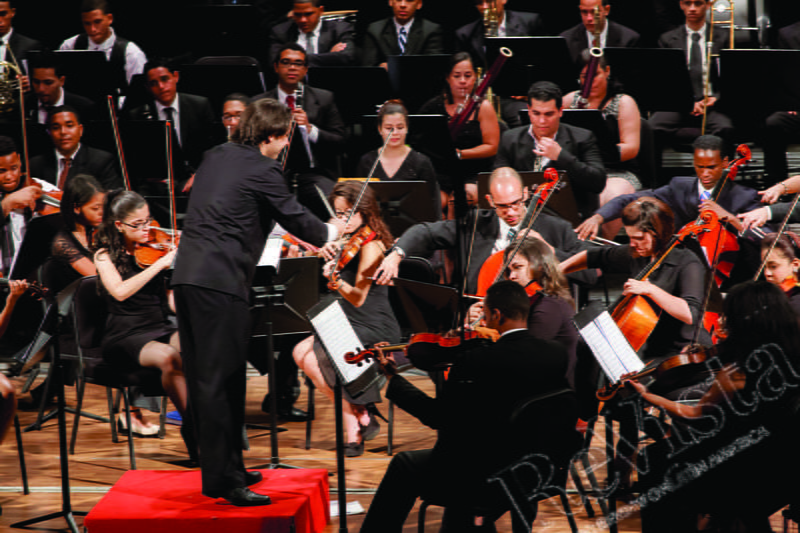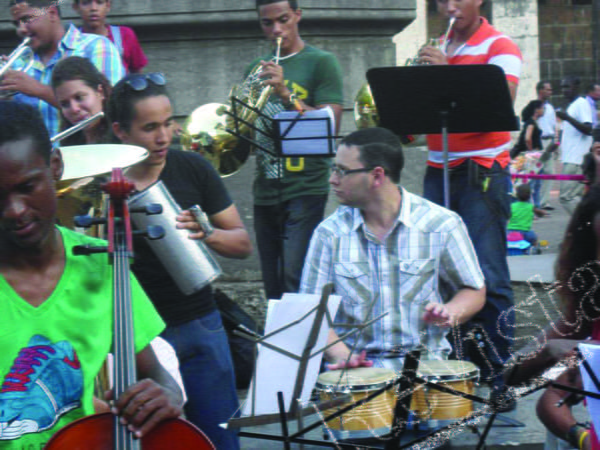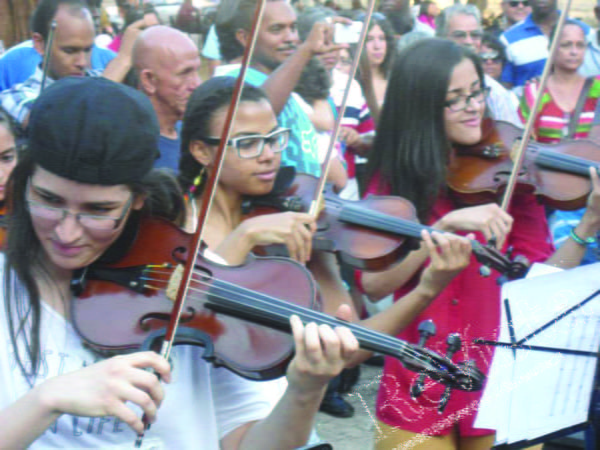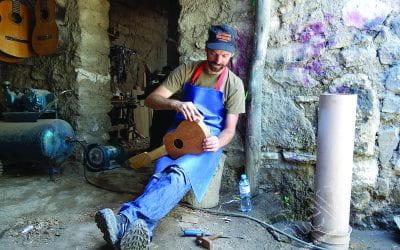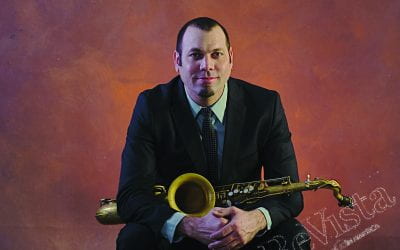When Music Changes Lives
The Youth Symphony Orchestras of Santo Domingo
In 2004, I got a surprising phone call from Santo Domingo on one cold winter night. I was then studying musical composition in Strasbourg, France, a great opportunity for a young Dominican musician. The officials of the recently elected government of my country were offering me a job to lead and reactivate the Sistema of youth orchestras in my homeland.
Most of you readers will know about El Sistema, the influential social movement created by Maestro José Antonio Abreu in the early 1970s in Venezuela. Without a doubt, the program is a model of altruism, vision and commitment, which brought to all of us the most transcendental change in musical education of the past decades—not only in Latin America, but in the entire world.
That movement gave rise to countless musicians playing a variety of instruments, as well as to the formation of children, youth and professional orchestras. Perhaps the most emblematic fruit of this movement is one of the stars of classical music, the youthful Venezuelan conductor Gustavo Dudamel, who currently leads both the Los Angeles Philharmonic and the Simón Bolívar Symphony Orchestra in Venezuela.
At 23 years of age, I had directed some concerts with a small youth orchestra. And I was already a composer and a professional violinist, but I had little experience in managing programs. I wasn’t sure why I had been chosen for the job, but I decided to take it after much deliberation. I packed my bags and said goodbye to France to return to Santo Domingo. I had what was needed to take on the task: youthful energy and a great desire to accomplish a lot.
Our Sistema had been founded by presidential decree in 1999. It was the result of visits by several Venezuelan musicians in the early 1990s. At that time, we witnessed the creation of the Juan Pablo Duarte Symphony Orchestra of the National Music Conservatory and later the National Youth Symphony Orchestra, the main musical group that gave rise to the beginnings of the Sistema.
The lives of many people changed through the Sistema. There are debates about whether this is the appropriate method for teaching music. I believe that the human aspect of this program takes precedence over any technical aspect, whether the method is effective or not. Ten years have gone by and we are now beginning to see the emotional impact that the Sistema has put into motion. Instead of theorizing, I will only say what I have experienced—together with thousands of children and youth and their relatives—throughout the Dominican Republic.
In early 2005, I traveled to Venezuela, where I met with Maestro Abreu, the founder of the Sistema. In his humble and simple manner, he asked me directly, “What do you need?” I told him that we need to start up the program, the most difficult task, and he talked about our mission as young Latin American musicians to multiply these teaching methods throughout our nations, “because everyone knows the reality of his or her country.” It was the first time I heard the word “multiply” outside of the context of arithmetic.
On my return home, I took up the challenge. The previous Youth Symphony Orchestra had disintegrated because of political instability. The first step was to recruit the most talented young musicians by seeking them throughout the country. I did not know many of the country’s provinces and often felt like a foreigner traveling in my own country. I knew the works of Pierre Boulez, Edgard Varese and Olivier Messiaen, but I didn’t have a clue about the mountainous province of Santiago Rodríguez in the northeast of the country.
Wherever I went, I found talent. I will never forget the small boy from the poor southwestern province of Hato Mayor, who arrived with a trumpet in his mouth. He only came up to my waist and the trumpet was almost bigger than he was. But he could really play, and we found examples of exceptional talent like his throughout our travels. My own life changed because these experiences taught me to value both my identity and my nation.
We didn’t have enough resources to absorb all these talented youth in our program, so we started small with the idea of reaching out to them in the future. The forty new members of the orchestra came from the provinces closest to Santo Domingo, the capital. We didn’t even have chairs or music stands yet, but the young musicians were motivated to travel four hours by bus to get to rehearsals. Many of them got up at dawn and arrived without having eaten a decent breakfast. Nevertheless, some of them blew their wind instruments forcefully, a metaphor perhaps for the enormous sacrifice they were making to be part of the new Sistema.
So I was learning how to direct the orchestra and they were learning at the same time to play instruments—a process of exchange in which distance disappeared between the conductor and his musicians and among the individual musicians.
The results of this new form of making music surpassed all expectations. In the summer of 2005, we offered a summer camp for the youth in which they performed Dvorak’s “New World Symphony” in its original version. Previously, the youth groups had performed simplified arrangements. I will never forget the look of satisfaction on the faces of the youth the night of the concert, nor will I forget the pride of their families watching them perform.
Most of the families had come from the provinces to see and hear their children play. One could see the importance of the support of each family, something the Sistema promotes.
After a year, with the help of the government, we organized more presentations (including an exchange program with a German youth orchestra), workshops, classes, and the establishment of some orchestral “nuclei,” small groups that operated in each locality (province, town or city) throughout the country.
Gradually, the older and more advanced youth took charge of these groups on their own initiative. The multiplying effect had begun. It was, for me, the unstoppable force of gratitude as a motivating energy.
In 2007, the orchestra that we had received in the exchange program invited us to Germany to perform on a concert tour. Our government paid for the high costs of the trip, a miracle of official largesse in our countries. More than half of the orchestra, which now boasted eighty members, needed to apply for passports since they had never before left the Dominican Republic.
The emotion was intense and the tour was a success by any standard. Perhaps this was the climax of our ten years of work: the first time these young people got on a plane, experienced another country, language, culture, went to theatres, museums, toured cities and got to perform in foreign venues. After Germany came New York—a further validation for our program.
Inspired once more by the Venezuelan model, we created the Youth Symphony Orchestra Foundation to continue with our expansion. We obtained financing for the orchestra and for others at the provincial level. We bought new instruments, increased the number of orchestra nuclei and held internationally oriented events with the visits of acclaimed maestros.
To my surprise, many of these programs run by themselves. This, I believe, demonstrates the power of inclusion, whether it is social, cultural, economic of educational.
We always want to grow more, of course. Former orchestra members are now conductors and teachers with the orchestral nuclei, and their parents are an essential part of our board of directors. We could say that we are one family spiritually united through music.
Recently, I decided to pursue a Master’s in orchestra conducting in the United States. The project keeps growing, even though I am not in Santo Domingo to represent the commitment of a new generation. I never expected that. Success is the fruit of the teaching and love that the true Sistema gives our youth.
Cuando la música cambia vidas
Una mirada humana al movimiento de orquestas sinfónicas juveniles en la República Dominicana
Por Darwin Aquino
Recibí una llamada telefónica desde Santo Domingo, una fría noche de invierno del año 2004, con una propuesta que me sorprendió. Me encontraba realizando estudios de composición musical en la ciudad de Estrasburgo, Francia, una gran oportunidad para un joven músico dominicano.
El recién elegido gobierno de mi país y sus nuevas autoridades culturales me ofrecían liderar el relanzamiento del Sistema de orquestas sinfónicas infantiles y juveniles. Todos conocemos a que me refiero, gracias al increíble movimiento social que creó el Maestro José Antonio Abreu a inicio de los años setenta, en Venezuela. Sin duda, un verdadero modelo de altruismo, visión y entrega, que nos legó a mi entender el cambio mas trascendental en la educación musical de las ultimas décadas. No solo para Latinoamérica, sino para todo el mundo.
De allí han surgido innumerables artistas en todos los instrumentos, orquestas sinfónicas infantiles, juveniles y profesionales, hasta llegar a su cima, con el ascenso de una de las máximas estrellas de la música clásica actual: el joven director Gustavo Dudamel.
Yo, con 23 años, había dirigido algunos conciertos con una pequeña orquesta de jóvenes. Era ya compositor y violinista profesional, pero en el ámbito de la dirección no había hecho mucho. No se aun las razones de mi elección, pero finalmente accedí. Empaque mis maletas y con un “au revoir” retorne a casa. Estaba listo, con lo único que tenia para enfrentar la inesperada tarea: grandes deseos y la energía de la juventud.
Nuestro Sistema fue creado en el 1999, por decreto presidencial. Fue el fruto de varias visitas de músicos venezolanos a inicios de los años noventa. Vivimos en ese entonces la creación de la Orquesta Sinfónica Juan Pablo Duarte, del Conservatorio Nacional de Música y mas tarde la Orquesta Sinfónica Nacional Juvenil, la principal agrupación del incipiente Sistema.
Quiero relatar como la vida de muchas personas cambia profundamente al formar parte de un Sistema. Hay debates sobre si es el modelo apropiado para la enseñanza musical. Pienso que su parte humana esta por encima de cualquier aspecto técnico, efectivo o no. Han pasado diez años, y ahora es cuando empiezo a reconocer el efecto emocional que ha desencadenado. En fin, esto es lo mas importante para nuestro destino como civilización. Solo puedo contar lo que he vivido junto a miles de niños y jóvenes músicos, y sus familiares, en toda la isla. Sin dudas, nuestra experiencia musical mas importante hasta el momento.
A inicios del 2005, al retornar a mi país, viaje a Venezuela. Allí me recibió calurosa y humildemente el Maestro Abreu. Su pregunta sencilla y directa: dime que necesitas? Nosotros necesitábamos arrancar, lo mas difícil. Me hablo de nuestra misión como jóvenes músicos latinoamericanos de multiplicar este modelo en nuestras naciones, pues decía que “cada quien conoce la realidad de sus países”. Fue la primera vez que escuche la palabra multiplicar, en ese contexto no matemático.
Vuelta a casa así inició. La pasada Orquesta Sinfónica Nacional Juvenil se había desintegrado, por inestabilidad política. Dicha agrupación esta llamada a reunir a los mejores talentos musicales a nivel nacional. La primera acción fue realizar un arduo proceso de reclutamiento que nos llevo a viajar por múltiples provincias del país. Muchas de ellas no las conocía. Era como un extranjero, llegado del extranjero, en mi propia tierra. Conocía la música de Boulez, Varese y Messiaen. Pero no había ido a Santiago Rodríguez, en la línea noroeste. Las muestras de talento no se hicieron esperar.
Nunca olvido aquel pequeño niño de la humilde provincia de Hato Mayor, al suroeste, que llego con trompeta en boca. No me pasaba de la cintura y la trompeta era casi mas grande que el. Así mismo nos sorprendimos con numerosos casos excepcionales en provincias del norte, sur y oeste. Mi vida cambió pues esto me enseño a darle valor a la propia identidad y a mi nación.
No teníamos los recursos suficientes para absorber a tantos niños que lo merecían. Iniciamos en pequeño para poder crecer con el deseo de llegar a ellos en un futuro. Los cuarenta nuevos miembros de la orquesta provenían entonces de las provincias mas cercanas a Santo Domingo, la capital, nuestra pequeña sede todavía sin sillas y atriles. Aun así, había niños y jóvenes que viajaban cuatro horas por autobús para llegar a los ensayos. Muchos se levantaban de madrugada y llegaban sin haber tenido un buen desayuno. Algunos de ellos aun así soplaban con fuerza sus instrumentos de viento! Entonces pude apreciar el enorme sacrificio que hacían para ser parte del nuevo Sistema, al lado de ellos, sentía que eran mucho mas grandes que los míos.
Me entrenaba dirigiendo la orquesta y ellos aprendían a tocar. Honestamente, no existe mejor escuela que esta. Un intercambio jovial de conocimientos, un dar y recibir. No hay distancia entre el director y sus músicos, ni entre los músicos en si, todo lo contrario. Creo que este es el elemento característico de este tipo de proyecto. Su sello indeleble.
Los resultados de esta nueva forma de hacer música sobrepasaron las expectativas. Ya en verano del 2005 pudimos brindar a mas jóvenes el acceso a la orquesta con un gran campamento de verano, donde tocamos la primera obra en versión original. En las agrupaciones jóvenes se interpretan arreglos o versiones mas sencillas. Tocamos la Sinfonía “Nuevo Mundo” de A. Dvorak. No olvido la cara de satisfacción de los jóvenes la noche del concierto y la de sus familias.
La mayoría de los familiares venían de las provincias a ver y oír a sus hijos tocar. El orgullo y satisfacción hacia brillar sus ojos. Entre ellos se sentía la percepción del efecto que tendría esa música en su descendencia. Allí pude palpar de cerca la importancia del apoyo familiar, algo que el Sistema promueve a toda capacidad.
Unos sesenta miembros nos acompañaban en esta travesía orquestal. Y así, después de un año, con ayuda de las autoridades, pudimos organizar mas presentaciones (incluyendo un intercambio con una joven orquesta alemana), talleres, clases y establecer algunos “núcleos” orquestales. Pusimos en práctica uno de los pilares del Sistema, la creación de pequeñas agrupaciones que funcionan exclusivamente en cada localidad (provincia, municipio o ciudad). Los nombres de estos remotos lugares recuerdan a localidades de “Cien Años de Soledad” de García Márquez, pero en mi corazón, despiertan recuerdos imborrables. Trabajamos en Santiago, Consuelo, Bani, Bonao y Santo Domingo, en las regiones norte, este, suroeste y sur, respectivamente.
Poco a poco los jóvenes mayores y mas avanzados, por iniciativa propia, se hacían cargo de los núcleos. El efecto multiplicador no se hizo esperar. Para mi, una lección mas, la fuerza indetenible del agradecimiento.
Cuando pensábamos que ya habíamos hecho mucho con los limitados recursos a mano, un gran milagro aconteció en el 2007. Nos íbamos para Alemania! Aquella orquesta que recibimos en intercambio nos había invitado a una gira de conciertos! Nuestro gobierno asumió con entereza los altos gastos del viaje, un milagro en nuestros países. Mas de la mitad de la Orquesta, ya en ochenta miembros, gestionó sus pasaportes por primera vez pues nunca habían abandonado la isla.
La emoción era intensa, sobrecogedora. La gira por la Selva Negra al sur de Alemania, fue un éxito. Hay historias personales que son siempre recordadas por nosotros, con frases como: “para el amor no hay idiomas”.
Quizás este fue el clímax de nuestros diez años de trabajo. Niños que subían por primera vez en un avión, conocían otro país, idioma, cultura, teatros, museos, ciudades, etc. Siempre me he preguntado si la vida les hubiese dado esa oportunidad fuera de la música. A Alemania siguió una gira de conciertos a Nueva York. Vivimos todos estos milagros como recompensa por el trabajo hecho.
Inspirados por el modelo venezolano, creamos la Fundación Orquesta Sinfónica Juvenil para continuar nuestra expansión. En el próximo lustro se logro el afianzamiento de la orquesta y de otras a nivel provincial, aumentaron los núcleos orquestales, adquisición de nuevos instrumentos, realización de importantes eventos de carácter internacional, con la visita de destacados maestros que han marcado nuestras temporadas de conciertos.
Al día de hoy muchas de estas iniciativas corren solas, para mi sorpresa. Esto me trae a la mente el poder de la inclusión, ya sea social, cultural, económica o educativa. El Sistema las contempla todas, de allí su grandeza y resultados.
Hemos crecido, por supuesto, nunca tanto como desearía. Los antiguos miembros de la Orquesta son ya maestros y directores de los núcleos orquestales y padres son parte esencial de nuestras directivas. Podemos decir que somos un familia que esta siempre unida espiritualmente a través de la música. Recientemente, decidí salir del país por un tiempo para realizar una Maestría en dirección orquestal. Me di cuenta que la verdadera maestría la había completado ya con el trabajo y experiencia adquirida.
El proyecto sigue creciendo aun no este en Santo Domingo, ya sea por compromisos internacionales o conciertos. Ha seguido creciendo con un compromiso firme de la nueva generación. Nunca lo esperaba.
He aquí lo que nos sorprende y enseña el amor. La base de un verdadero Sistema.
Winter 2016, Volume XV, Number 2
Darwin Aquino is a conductor, compositor and violinist. He is the Dominican representative to the Jeunesses Musicales International, the Central American Youth Orchestra and the Youth Orchestra of the Americas (YOA). The youngest member of the Latin American Composers Union, he has received three Dominican music prizes, as well as the Young Artist Humanitarian Award from the Hildegard Behrens Foundation in the United States. www.darwinaquino.com
Darwin Aquino es director de orquesta, compositor y violinista dominicano. Es representante dominicano en Jeunesses Musicales International, Orquesta Juvenil Centroamericana y Orquesta Juvenil de las Américas (YOA). Es el miembro mas joven del Colegio Latinoamericano de Compositores. Galardonado con tres premios nacionales de música y el Young Artist Humanitarian Award de la Hildegard Behrens Foundation de los Estados Unidos. www.darwinaquino.com
Related Articles
Notes on Mexican Rock
English + Español
Since the 1960s, there’s been a booming underground rock scene in Mexico. It defines itself as countercultural, but not in absolute opposition to the mainstream—although sometimes it…
Nature’s Sonorous Politics
English + Español
There’s no indigenous political movement in Andean Peru. This, at least, has been the consensus view of scholars since the 1990s, when protests organized by indigenous parties shook the…
Musical Identity
English + Español
Frankly, I’m not used to talking about myself, and even less writing about myself. My way of expressing myself has been through musical notes, whether the buoyant Cuban clave rhythms…

